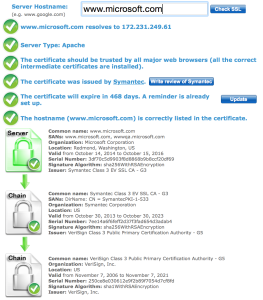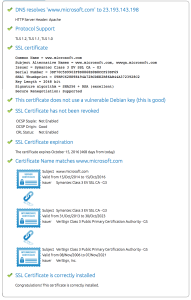The Internet is a cooperative system: CNAME to Dyn DNS outage of 6 July 2015
Today, shortly after 21:00 UTC, on our internal operations chat there was a scary message from one of our senior support staff: "getting DNS resolution errors on support.cloudflare.com", at the same time as automated monitoring indicated a problem. Shortly thereafter, we saw alarms and feedback from a variety of customers (but not everyone) reporting "1001 errors", which indicated a DNS resolution error on the CloudFlare backend. Needless to say, this got an immediate and overwhelming response from our operations and engineering teams, as we hadn't changed anything and had no other indications of anomaly.
In the course of debugging, we were able to identify common characteristics of affected sites—CNAME-based users of CloudFlare, rather than complete domain hosted entirely on CloudFlare, which, ironically, included our own support site, support.cloudflare.com. When users point (via CNAME) to a domain instead of providing us with an IP address, our network resolves that name —- and is obviously unable to connect if the DNS provider has issues. (Our status page https://www.cloudflarestatus.com/ is off-network and was unaffected). Then, we were investigating why only certain domains were having issues—was the issue with the upstream DNS? Testing whether their domains were resolvable Continue reading
Cisco Deepens French Connection With 6WIND Investment
 Mon Dieu! Cisco backs 6WIND.
Mon Dieu! Cisco backs 6WIND.
IT Professionals Share SDN Expectations in New Research
 By now, we all know the benefits of SDN, but what about its challenges? New research lays out the expectations of IT professionals.
By now, we all know the benefits of SDN, but what about its challenges? New research lays out the expectations of IT professionals.
1 Year Anniversary for Networking With Fish
It seems like just yesterday I was at CiscoLive in San Francisco asking people I had met on twitter about their experiences blogging as well as hosting a web page. Today? Last week marked the 1 year anniversary of “Networking With Fish”.
I want to say thank you.
Those of you who know me, know that I’m not much on the idea of one person’s success being solely on them. That can be a philosophical debate for some other day. But suffice it to say I had nothing to do with the IQ or EQ I was born with. Also while I was studying for my certifications…. I was reading documents and books that other people wrote.
So too with success of Networking With Fish.
So please indulge me for one moment on this 1 year Anniversary to say “thank you” to all those who were instrumental in the success of this web site. Your mug is in the mail. 
Russ White – Much starts with Russ. My CiscoLive career started because he asked me to be a speaker for CiscoLive 2006. My becoming a CiscoLive Session Group Manager is because he Continue reading
Federal Security Compliance: Challenges, Consequences, and a Solution
Information security is important to every organization, but when it comes to government agencies, security can be considered the priority.Operational Annoyances: Validating SSL VIPs

In the last two posts I described tools to validate the required intermediate SSL certificate chain for a given server certificate, and to validate that the private key and server certificate are a match. Once the SSL configuration is deployed though, how do we check that everything is working correctly and the new certificate is in place?
Checking deployed SSL Certificates and Intermediates
The simple answer is “use one of the tools already out there on the Internet.” That’s a fair answer, and I have been known to use some of these. A quick Google search shows a validator on SSLShopper:
There’s also a similar tool on DigiCert:
These are great tools and I strongly encourage using them to check your sites. However, there’s one situation where they can’t help you, and that’s when your site is only accessible internally. How do I do certificate validation for private sites?
OpenSSL To The Rescue. Again
Yet again, OpenSSL is my tool of choice because not only can it open an SSL connection to a VIP, but it can also show the certificates it is sent. You may be thinking “Why not just use a web browser?” Again, Continue reading
‘Digital Utility’ Startup Picks Avaya Fabric Connect
 Steel ORCA has eventual plans for Avaya's Fx architecture for SDN.
Steel ORCA has eventual plans for Avaya's Fx architecture for SDN.
Reaction: SD-WAN and Multiple Metrics
Ivan has posted a reaction to Ethan, which prompts me to… Okay, let’s start at the beginning. Ethan wrote a nice post on SD-WAN and the “shortest path we always wanted,” covering some of the positive and negative aspects of software defined WAN.
Ivan responded with this post, in which he says several interesting things, prompting some thoughts from yours truly…
Routing in SD-WAN environment is almost trivial…
Depends on what you mean when you say “routing…” If routing here means the discovery of the topology, and computing a best path through a topology, then controller based (centralized) “routing” is almost certainly more complex than distributed routing protocols. If routing here means, “take into consideration a wide swath of policies, including which link is most loaded right now, which link has the shortest queues, and lots of other things, and compute me a best path,” then a controller based centralized system is most likely going to be less complex. Take a gander through my last set of NANOG slides if you want to see where my thinking lies in this area — or read my new book on network complexity if you want a longer explanation.
The question is — Continue reading
SDN Disruption: Has The Pendulum Swung Too Far?
The networking industry is so obsessed with software-defined networks that people are forgetting to consider the trade-offs with technologies like OpenFlow and VXLAN.Network Automation Benefits
Different forms of network automation can save you time, increase business agility, and improve service levels.Worth Reading: Currency and the Cloud
The post Worth Reading: Currency and the Cloud appeared first on 'net work.

